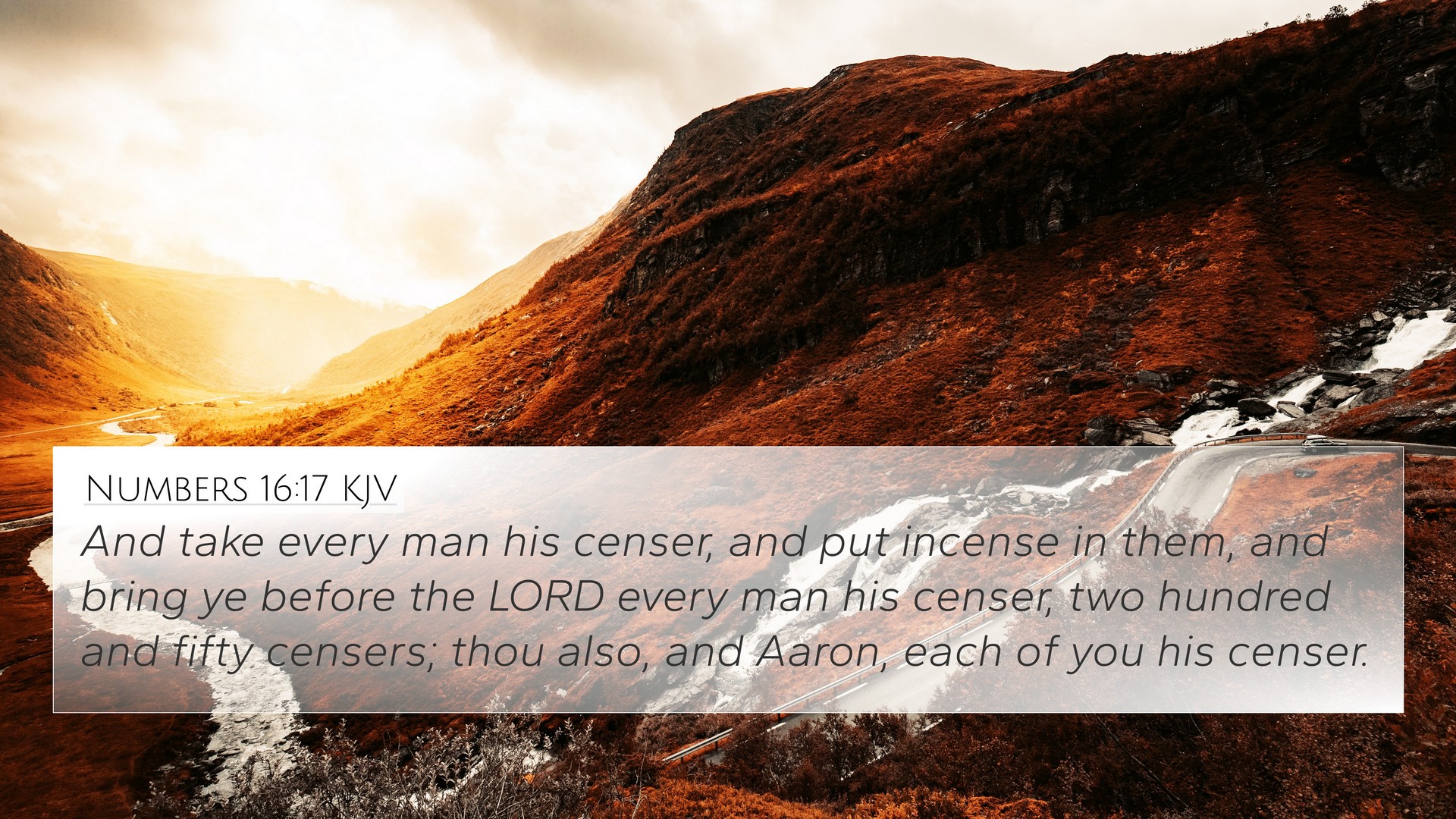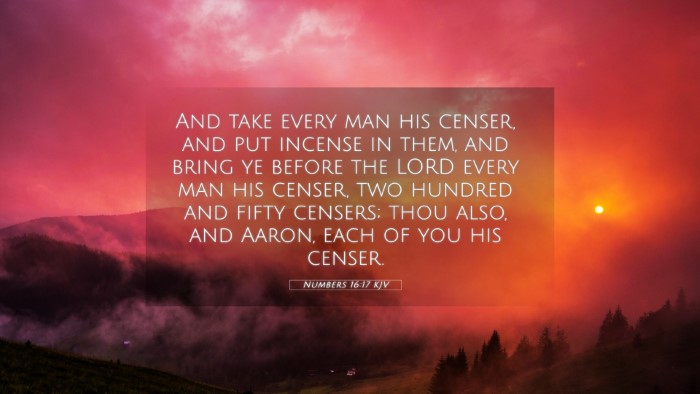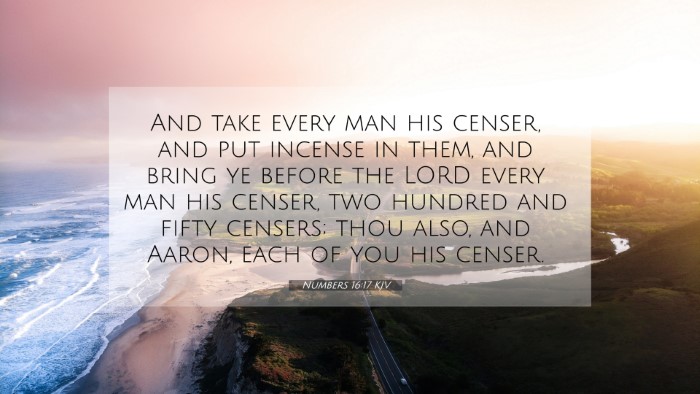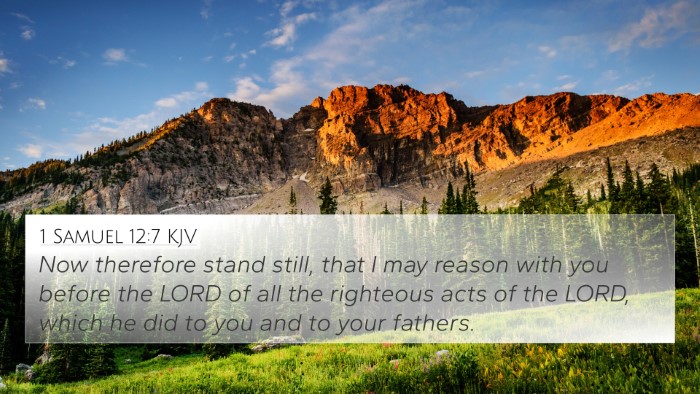Understanding Numbers 16:17
Verse: Numbers 16:17 - “And let them take every man his censer, and put incense in them, and bring ye before the LORD every man his censer, two hundred and fifty censers: thou also, and Aaron, each of you his censer.”
Summary of Biblical Significance
Numbers 16:17 occurs during a pivotal moment in the narrative of the Israelites' journey through the wilderness. The context involves the rebellion of Korah, Dathan, and Abiram against the authority of Moses and Aaron. This request for each leader to bring a censer and offer incense symbolizes a challenge to the established spiritual leadership among the people of Israel.
Commentary Insights
Matthew Henry's Commentary
Matthew Henry emphasizes that the act of offering incense was a significant priestly duty, reserved for Aaron and his descendants. By calling for each leader to present their censer, the rebels inadvertently reveal their pride and direct challenge against God’s ordained priesthood. This act serves to test who is rightfully appointed by God, showcasing a division between divine order and human ambition.
Albert Barnes' Commentary
Albert Barnes provides insight into the significance of incense within the biblical framework, noting that it symbolizes prayer and worship. The censer, traditionally used in Temple worship, signifies a mediator's role between God and Israel. Barnes discusses how the rebellion was not merely against Moses and Aaron but a direct affront to God’s chosen means of worship and mediation.
Adam Clarke's Commentary
Adam Clarke highlights the symbolism of the censer further, noting that incense offered to the Lord represents the prayers of the saints. He underlines that the actions of Korah and his company signify a deeper spiritual issue — the desire to usurp roles designated by divine authority. Here, Clarke warns against any attempt to rival God’s established order, emphasizing God's ultimate judgment on such rebellion.
Thematic Connections
This verse invites a broader understanding through several thematic Bible verse connections. It resonates with various instances in Scripture where the themes of authority, worship, and divine judgment come into play.
- 1 Samuel 15:23 - Discusses rebellion as akin to witchcraft, emphasizing the seriousness of opposing God’s commands.
- Leviticus 10:1-3 - The account of Nadab and Abihu, who offered unauthorized fire before the Lord, which led to dire consequences.
- Hebrews 10:31 - Warns that it is a fearful thing to fall into the hands of the living God, a reminder of God’s judgment on rebellious actions.
- Revelation 8:3-4 - Describes the incense as the prayers of the saints, linking the notion of worshipful prayer back to the concept of the censer.
- James 4:6 - Highlights that God opposes the proud but gives grace to the humble, underlying the attitude behind Korah’s rebellion.
- Galatians 6:7 - Teaches that one reaps what they sow, a principle evident in the ensuing consequences faced by Korah and his followers.
- Exodus 30:34-38 - Details the proper preparation of incense, showcasing the sacredness of worship and the need for adherence to God’s ways.
- Numbers 16:30 - Points to God's vindication of His chosen leaders, as seen through the miraculous sign against the rebels.
- Romans 13:1 - Affirms that all authority is instituted by God, promoting submission to His established order.
- Acts 5:29 - Suggests the principle that one must obey God rather than human authority, relevant to understanding obedience in spiritual leadership.
Cross-Referencing Biblical Texts
When performing scriptural cross-referencing, it is vital to examine the broader narrative and doctrinal implications of Numbers 16:17. Consider how it aligns with various military and leadership dynamics in the Old Testament that inform New Testament teachings on authority, humility, and obedience to God's will.
Conclusion
The events surrounding Numbers 16:17 stand as a cautionary tale against the human tendency to challenge divinely appointed leadership. The ceasing of incense offerings and the call towards prayer remind believers today of the importance of adhering to God's structure in worship and authority.
Through tools such as a bible concordance, and proper understanding of the bible cross-reference guide, believers can explore profound insights into scriptural themes, facilitating deeper engagement with the text and fostering spiritual growth.



